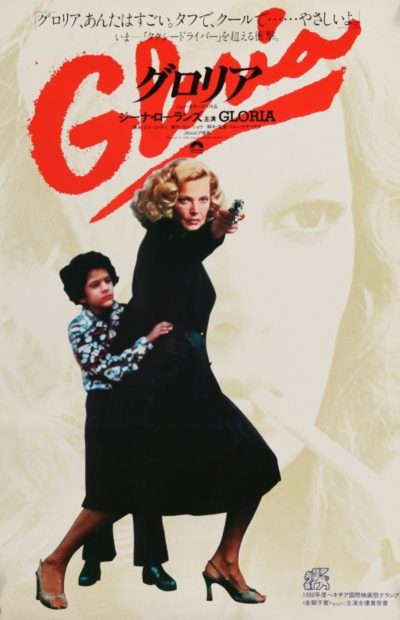★★★½
“Gloria, you’re always on the run now…”
 Yeah, I’ll confess to having Laura Branigan’s eighties hit running through my head on repeat almost the entire movie, even if its lyrics can only be tangentially tied to it. What also struck me is how strong of an influence this was on Luc Besson’s Leon, especially at the beginning. I mean: a criminal gang takes out an entire family in a New York tenement, except for one child, as punishment for the father having tried to steal from them. That survivor takes refuge with a very reluctant neighbour with mob ties, who then has to protect the child as they move about the city. There’s even a scene where one of the gang fires his gun at a nosy resident.
Yeah, I’ll confess to having Laura Branigan’s eighties hit running through my head on repeat almost the entire movie, even if its lyrics can only be tangentially tied to it. What also struck me is how strong of an influence this was on Luc Besson’s Leon, especially at the beginning. I mean: a criminal gang takes out an entire family in a New York tenement, except for one child, as punishment for the father having tried to steal from them. That survivor takes refuge with a very reluctant neighbour with mob ties, who then has to protect the child as they move about the city. There’s even a scene where one of the gang fires his gun at a nosy resident.
In this case, the protective neighbour is Gloria Swenson (Rowlands), and the child is Phil Dawn (Adames), son of a mob accountant, who is also in possession of a highly incriminating notebook given to him by his father. Gloria makes no bones about her opinion, telling the parents, “I hate kids, especially yours.” However, necessity is the mother of motherhood, as it were, and her maternal instincts end up being awakened by six-year-old Phil, who swings wildly between acting three times his age and one-third of it. Gloria has no issue with using lethal force against those she perceives as a threat, as she seeks to broker a deal that will trade the book in exchange for her and Phil being allowed to walk away. This brings her into contact with mob boss Tarzini (Franchina) – not for the first time.
Rowlands is great in this, and you can see why she’s one of the few actresses to have been nominated for an Oscar in a girls with guns role. Director Cassavetes was her husband – he was originally just going to sell the script, but took on the director’s role after his wife was cast – and their long history of working together likely helped provide her nuanced performance. The problems are elsewhere. Phil is certainly no Matilda, and I was largely with the opinion Gloria expressed above. There’s also no-one like Stansfield, to act as an antagonist. Tarzini isn’t seen until the end, and up to that point, Gloria is opposed largely by a series of faceless goons.
Even given her background, it does seem remarkably convenient how she and they seem to stumble into each other in every other scene. It’s as if the film took place in a small farming town, rather than a city of over seven million inhabitants at the time. However, the film is never less than engaging due to Rowlands, who was fifty when the film came out, so is definitely older than your typical action heroine. Though your biggest takeaway may be how early eighties it all feels. Chris, who lived in New York at the time, loved that even seeing a car identical to her first one parked in a scene. Personally, I just had to marvel at how an unaccompanied six-year-old could buy a train ticket from New York to Pittsburgh without anyone batting an eyelid. Truly, a very different world… But what I really want to know is this: what happened to Gloria’s cat?
Dir: John Cassavetes
Star: Gena Rowlands, John Adames, Basilio Franchina, Buck Henry




